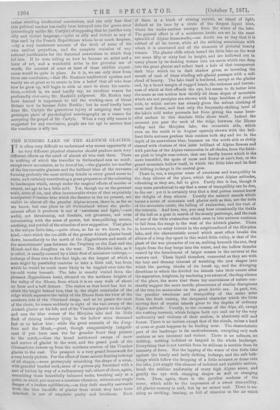THE ICEBERG LAKE OF THE ALETSCH GLACIER.
IT is often very difficult to understand why scenes apparently of no very different physical character should produce such very different effects on the mind of almost all who visit them. There is nothing of which the traveller in Switzerland sees so mucl's -except snow mountains, as he does of ice,—the gigantic ice-needles of the innumerable glaciers and the brilliant blue of the crevasses 'forming probably the most striking details in every grand scene he visits, and certainly contributing a great proportion of the colouring to landscapes which, except under the magical effects of sunrise or sunset, are apt to be a little cold. Yet, though ice on the greatest scale, acres of ice, and often innumerable rivers of that exquisitely transparent Prussian-blue which the fissures in the ice present, are visible in almost all the grander Alpine scenes, there is, as far as • we know, but one place in all Switzerland where the predo- minant effect it produces is one of 'sweetness and light,'—not awful, not threatening, not desolate, not gruesome, not even intoxicating with the sense of power, but tranquillizing, serene, soothing, and yet full of the stimulus of new suggestion. That place is the unique little lake,—quite alone, as far as we know, in its kind,—into which the ice-cliffs of the greater Aletsch glacier break down, immediately to the north of the /Eggischhorn and south of the mountaineers' pass between the Trugberg on the East and the Munch and the Jungfrau on the west. The Miirjelen lake, as it is called, is usually covered by a little fleet of miniature icebergs,— icebergs of from two to five feet high, on the largest of which a man might by possibility contrive to take a little sail, but from which he would be much more likely to be toppled over into the ice-cold water beneath. The lake is usually visited from the pleasant sEggischhorn hotel, situated on the northern heights of the valley of the Rhone, from which it is an easy walk of about an hour and a half distant. The visitor at that hotel has but to .climb the height behind him, that is, the slight remainder of the ridge which separates the valley of the Rhone from the view of the southern side of the Oberland range, and as he passes the neck of the chain, he comes suddenly in sight of the vast sweep of the Aletsoh glacier on his left, and of the Vieecher glacier on his right, and sees the blue waters of the Miirjelen lake and its little flock of shining icebergs lying in the hollow some thousand feet or so below him ; while the great summits of the Jung- frau and the Monk,—great, though comparatively insignifi- cant if you have seen the far grander front they present to the north,—close the broad northward sweeps of snow and curves of glacier to the west, and the grand peak of the Oberaarhorn towers up from the northern sources of the Viescber glacier to the east. The prospect is a very grand framework for a very lovely picture. For the effect of these minute floating icebergs of all shapes,—some grotesquely mimicking the shape of a swan, with graceful bonded neck, some of a guinea-pig furnished with a sort of button by way of a rudimentary tail, others of them, again, resembling those beautifully balanced racks, touching only at a point, in which you maysee a constant vibration, without any single danger of a broken equilibrium,—as they drift steadily eastwards from the blue ice-cliffs of glacier from which they have been detached, is one of exquisite purity and loveliness. Each
of them is a block of shining crystal, an island of light, cleaned at its base by a circle of the deepest liquid blue, where the under-surface emerges from the water of the lake. The general effect is of a miniature Arctic sea set in the most splendid of Alpine frame works,—an Arctic sea so tiny that it is robbed of all its terror, while all the striking associations with which it is associated and all the elements of pictorial beauty remain. The glacier cliffs which bound the little lake on the west are some fifty or sixty feet in height, and are hollowed out in many places by its dashing waters into ice-caves which run deep into the great glacier and reflect back a halo of that transparent dark blue which ice in dark shadow gives, so investing the mouth of each of these winding sub-glacial passages with a soft cloud of beauty. The lake itself is bordered, except at the glacier end, by a broad margin of rugged beach, the rudeness and barren- ness of which at first offends the eye, but seems to fit better into the scene as one notices how thickly all those slopes of mountain which are not precipice are strewn with huge boulders of similar rock, to which nature has already given the softest clothing of moss and flower, and that only the frequently-shifting level of the lake's cold water prevents her from giving the same beau- tiful surface to this desolate little shore itself. Indeed the moment you pass the neck of the ridge, between the Rhone valley and the Miirjelen lake, the mountain side, which even on the south is in August sparsely strewn with the bril- liant little autumn geutian that outdoes both sky and ice in the depth of its marvellous blue, becomes on the north side so richly starred with clusters of this 'most brilliant of Alpine flowers and with patches of the Alpha() ranunculus in all shades, from the faint- est pink to bright rose-colour, that one hardly knows which is the more beautiful, the spots of moss and flower at one's feet, or the grand mountain hollow itself, in which the little lake and its fleet of drifting icebergs is the central gem.
There is, too, a singular sense of sweetness and tranquillity in the deep silence of the place, which the great Alpine solitudes, refreshing as they are, fail to give. Partly this is due, though it may seem paradoxical to say that a sense of tranquillity can be due, to the ear ; yet it is certainly true that a deaf person cannot know the delight of deep silence. Usually the natural sounds which haunt a scene of mountain and glacier such as this, are the bells of the mountain cattle, the falling of avalanches, and the rush of the torrents. And here, too, you may hear occasionally the tinkle of the bell on a goat in search of the scanty pasturage, and the rush of one of the little avalanches which even in late autumn continue to fall from the range to the west of the Aletsch glacier. There is, however, no noisy torrent in the neighbourhood of the Miirjelen lake, and the characteristic sound which most often breaks the silence of a long day spent in this weird little valley, is that of the plash of the wee pinnacles of ice as, melting beneath the sun, they topple from the tiny bergs into the water, and the hollow thunder caused by the detachment of larger masses in the caverns at the western end. These liquid thunders, connected as they are with the lazy and dreamy interest of watching the new shapes into which the parting blocks of ice break up, and the diverging directions in which the divided ice islands take their course after the separation, heighten, by rendering you aware of, the deep silence of the place, the more that these toy convulsions of nature con- stantly suggest the more terrific phenomena of similar disruptions of the true ice mountains on the great Arctic sea, In part, too, the peculiar sweetness and tranquillity of the scene arise from the fresh variety, the chequered character which the little moving fleet of crystal islands gives to the depths of ordinary Alpine solitude. Usually, in the recesses of the Alps, all, except the rushing torrents, which fatigue both eye and ear by the very uniformity and violence of their motion, is absolutely still and frozen. There is no motion except that of the clouds, unless a herd of cows or goats happens to be feeding near. The characteristic part of the landscape is its motionlessness, excepting only such motions as are incessant and violent. There is no softness, no drifting, nothing indolent or languid in the whole landscape. Everything that is not terrible from its stillness is terrible from its intensity of force. But the lapping of the water of this little lake against the lonely and lazily drifting icebergs, and the soft bub- blings which follow the dropping of a little minaret or dome into the lake, just supply this element of indolent and variable motion, break the sublime uniformity of every high Alpine scene, and gratify the eye with changing shapes as well as changing
tints. Then, again, there is the peculiar coolness of the scene, which adds to the impression of a sweet tranquillity. All glacier scenery is cold, but by no means cool. There is no- thing so exciting, bracing, so full of stimulus as the air which Vows over a great glacier. But it gives anything but that sense of soft refreshment which we attach to the idea of coolness on a lot August day. For coolness we need, not the bright gelid :atmosphere which braces to exercise, not the vast slopes and plains of ice which chill and overwhelm us, but the softer -sights and sounds which suggest the melting of cold into warmth, the tempering of warmth by cold, and shelterings from sun and 'wind alike. Such sights and sounds you have beside this little lake as the transparent blocks of ice crumble under the sun's rays, and the current ripples gently against them as (they daft ashore. Nothing more refreshing, more soothing, more fascinating, not only in spite, but in consequence of, the grandeur of the frame in which it is set, is to be found in :Switzerland. The man wearied by toil at home, and, perhaps, a little too high strung by the sublimity usually before him in Switzerland, finds just the relaxation he needs by the side of these glittering little toy icebergs on the lonely tarn. If he has .carried hither the hot thoughts and tangled questionings which the hurry of the world at once raises, and prevents from settling (into any order and clearness, in his mind, he will almost feel dis- posed in this strange spot to say, with the traitor Judas of Mr. Arnold's poem, as he reveals to St. Brandan his respite from tor- ment for a single hour on every Christmas Eve,—
,1I staunch with ice my burning breast, With silence balm my throbbing brain ;"—
for in all the brilliant and stimulating scenes of Europe's great "playground," we know of none where the solitude is at once so grand and gentle, so deep and yet so fascinating, where minia- ture beauties of both ice and flowers are so weirdly blended with .majestic forms, as in the little iceberg lake of the 2Eggischhorn.



































 Previous page
Previous page